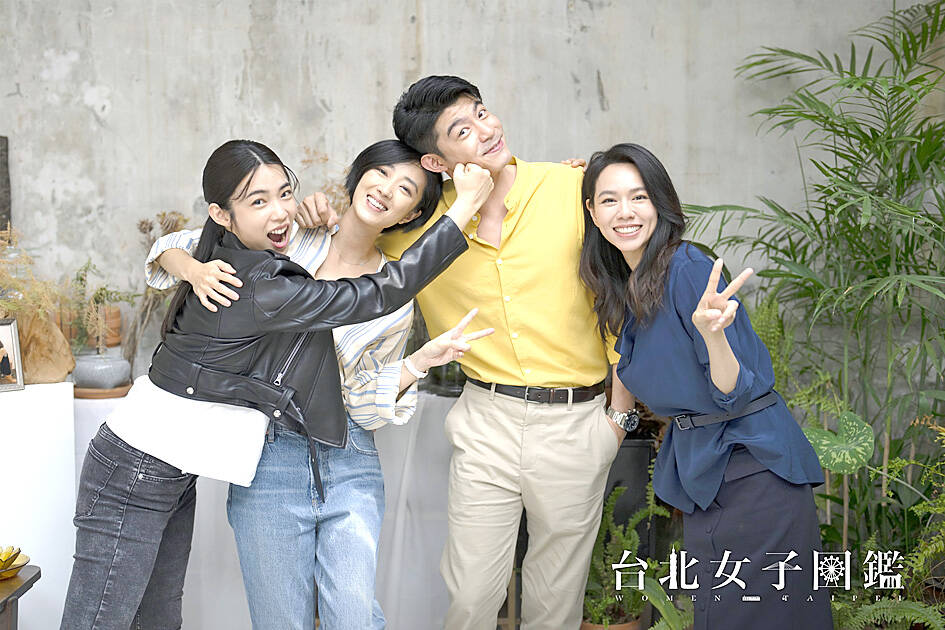The recently released Taiwanese streaming show Women In Taipei (台北女子圖鑑) is being panned online for its stereotypical depictions of the differences between northern and southern Taiwan, with some people harassing its two screenwriters online.
Adapted from the popular Japanese TV series Tokyo Girl, which aired from 2016 to 2017, Women In Taipei debuted last month on Disney+ with an all-star cast featuring Kuei Lun-mei (桂綸鎂), Wang Po-chieh (王柏傑), Rhydian Vaughan (鳳小岳) and Chang Hsiao-chuan (張孝全).
The drama follows the life of Lin I-shan (林怡姍), played by Kuei. Lin, who was born in Tainan and moved to Taipei for work, struggles with relationships, her job and life as she strives to become the woman she aspires to be.

Photo courtesy of Disney+
The first three episodes that have been aired so far have generated heated discussions about cultural comparisons between urban and rural life, and north and south Taiwan.
Taipei is depicted as a cold and detached concrete jungle with lines such as “authentic Taipei people would not go sticking their noses into other people’s business” or “girls in Taipei are afraid of poverty, ugliness and failure.”
The differences between the north and south in the series are “untrue, hackneyed and stereotypical,” an online commentator said.
To highlight the difference between Tainan’s Yongkang District (永康), where Lin grew up, and Taipei’s Yongkang Street (永康街), where she works, the show incorrectly depicts Yongkang District as rural, showing fish farms that do not exist in the area, people said.
Some people said it was likely the screenwriters have never been to Tainan, while others said the series depicted Tainan residents as slow.
Some people have harassed the screenwriters on social media.
Award-winning screenwriter Wu Luo-ying (吳洛纓) called the behavior “cyberbullying” in a post on Facebook on Saturday, adding that people harassing the writers do not “truly understand the role and decisionmaking power of writers in the film and television industry.”
The production team and the streaming platform should face criticism from the audience as well, she said, adding that screenwriters often have to satisfy demands from executive producers to get paid.
The audience usually praises actors and directors for a hit show, but blame screenwriters for an unsatisfactory one, she said.
People familiar with the show said that some parts of the story were added by the production company, citing a scene in which Lin wears makeup for a job interview that “makes her look like she is not from Taipei” and is rejected for the job.
The negative feedback has generated a wave of memes and discussions on social media, which can be seen as a successful example of “negative marketing,” some people said.
Tu Cheng-che (杜承哲), a doctor at Cheng Ching Hospital’s thoracic surgery division, posted a meme of the show on Facebook featuring six celebrities from Tainan, including K-pop idol Chou Tzu-yu (周子瑜) and supermodel Lin Chi-ling (林志玲).
“I just wanted to show that both Taipei and Tainan are good,” he wrote in the post.
Additional reporting by I Hui-tzu and CNA

Alain Robert, known as the "French Spider-Man," praised Alex Honnold as exceptionally well-prepared after the US climber completed a free solo ascent of Taipei 101 yesterday. Robert said Honnold's ascent of the 508m-tall skyscraper in just more than one-and-a-half hours without using safety ropes or equipment was a remarkable achievement. "This is my life," he said in an interview conducted in French, adding that he liked the feeling of being "on the edge of danger." The 63-year-old Frenchman climbed Taipei 101 using ropes in December 2004, taking about four hours to reach the top. On a one-to-10 scale of difficulty, Robert said Taipei 101

Nipah virus infection is to be officially listed as a category 5 notifiable infectious disease in Taiwan in March, while clinical treatment guidelines are being formulated, the Centers for Disease Control (CDC) said yesterday. With Nipah infections being reported in other countries and considering its relatively high fatality rate, the centers on Jan. 16 announced that it would be listed as a notifiable infectious disease to bolster the nation’s systematic early warning system and increase public awareness, the CDC said. Bangladesh reported four fatal cases last year in separate districts, with three linked to raw date palm sap consumption, CDC Epidemic Intelligence

US climber Alex Honnold left Taiwan this morning a day after completing a free-solo ascent of Taipei 101, a feat that drew cheers from onlookers and gained widespread international attention. Honnold yesterday scaled the 101-story skyscraper without a rope or safety harness. The climb — the highest urban free-solo ascent ever attempted — took just more than 90 minutes and was streamed live on Netflix. It was covered by major international news outlets including CNN, the New York Times, the Guardian and the Wall Street Journal. As Honnold prepared to leave Taiwan today, he attracted a crowd when he and his wife, Sanni,

Two Taiwanese prosecutors were questioned by Chinese security personnel at their hotel during a trip to China’s Henan Province this month, the Mainland Affairs Council (MAC) said yesterday. The officers had personal information on the prosecutors, including “when they were assigned to their posts, their work locations and job titles,” MAC Deputy Minister and spokesman Liang Wen-chieh (梁文傑) said. On top of asking about their agencies and positions, the officers also questioned the prosecutors about the Cross-Strait Joint Crime-Fighting and Judicial Mutual Assistance Agreement, a pact that serves as the framework for Taiwan-China cooperation on combating crime and providing judicial assistance, Liang